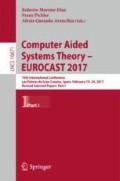Abstract
In building models that causally explain observed data and future data, econometricians must grapple with quantifiable uncertainty, or risk, and unquantifiable Knightian uncertainty, or ambiguity. In contrast, machine learning practitioners work with statistical models for a data set that enable predictions about data items imputed to be in the data set. Recently these two distinct modeling concepts have become topics of mutual interest in economics and machine learning. We take the viewpoint here that a data set implicitly embodies the ambiguity of the generating processes from which it arises. We present a data model incorporating ambiguity that we dub the Inscrutable Decision Maker (IDM) derived from the Anscombe-Aumann model of subjective utility.
Access this chapter
Tax calculation will be finalised at checkout
Purchases are for personal use only
References
Anscombe, F.J., Aumann, R.J.: A definition of subjective probability. Ann. Math. Stat. 34(1), 199–205 (1963)
Arrow, K.J.: Alternative approaches to the theory of choice in risk-taking situations. Econometrica 19(4), 404–437 (1951)
Baum, L., Petrie, T.: Statistical inference for probabilistic functions of finite state Markov chains. Ann. Math. Stat. 37(6), 1554–1563 (1966)
Choquet, G.: Theory of capacities. Annales de l’institut Fourier 5, 131–295 (1953)
Domingos, P.: The Master Algorithm: How the Quest for the Ultimate Learning Machine Will Remake Our World. Basic Books, New York (2015)
Ellsberg, D.: Risk, ambiguity, and the savage axioms. Q. J. Econ. 75(4), 643–669 (1961)
Getoor, L., Culler, D., de Sturler, E., Ebert, D., Franklin, M., Jagadish, H.V.: Computing Research and the Emerging Field of Data Science (2016). http://cra.org/wp-content/uploads/2016/10/Computing-Research-and-the-Emerging-Field-of-Data-Science.pdf
Gilboa, I., Marinacci, M.: Ambiguity and the Bayesian paradigm. In: Arló-Costa, H., Hendricks, F.V., van Benthem, J. (eds.) Readings in Formal Epistemology. SGTP, vol. 1, pp. 385–439. Springer International Publishing, Cham (2016). https://doi.org/10.1007/978-3-319-20451-2_21
Hansen, L.P., Marinacci, M.: Ambiguity Aversion and Model Misspecification: An Economic Perspective (2016). http://didattica.unibocconi.it/mypage/dwload.php?nomefile=approximate-02-June-201620160608190839.pdf
Hvistendahl, M.: Crime forecasters. Science 353, 1484–1487 (2016)
Angrist, J., Pischke, J.S.: The credibility revolution in empirical economics: how better research design is taking the con out of econometrics. J. Econ. Perspect. 24(2), 3–30 (2010)
Kirkpatrick, K.: Battling algorithmic bias. Comm. ACM 59, 16–17 (2016)
Knight, F.H.: Risk, Uncertainty, and Profit. Houghton Mifflin Co., New York (1921)
Lane, D.A., Maxfield, R.R.: Ontological uncertainty and innovation. J. Evol. Econ. 15(1), 3–50 (2005)
Leamer, E.E.: Let’s take the con out of econometrics. Am. Econ. Rev. 73(1), 31–43 (1983)
Leamer, E.E.: Tantalus on the road to asymptopia. J. Econ. Perspect. 24(2), 31–46 (2010)
Liptak, A.: Sent to prison by a software program’s secret algorithms. New York Times, 1 May 2017. https://www.nytimes.com/2017/05/01/us/politics/sent-to-prison-by-a-software-programs-secret-algorithms.html
McCulloch, C.E., Searle, S.R., Neuhaus, J.M.: Generalized, Linear, and Mixed Models. Wiley Series in Probability and Statistics. Wiley, Hoboken (2008)
O’Neil, C.: Weapons of Math Destruction: How Big Data Increases Inequality and Threatens Democracy. Crown, New York (2016)
Smith, R.E.: Idealizations of uncertainty, and lessons from artificial intelligence. Econ.: Open-Access Open-Assess. E-J. 10(2016-7), 1–40 (2016). https://dx.doi.org/10.5018/economics-ejournal.ja.2016-7
Smithson, M.: Ignorance and Uncertainty, Emerging Paradigms. Cognitive Science. Springer-Verlag, New York (1989). https://doi.org/10.1007/978-1-4612-3628-3
Stratonovich, R.: Conditional Markov processes. Theory Probab. Appl. 5(2), 156–178 (1960)
Taleb, N.: The Black Swan: The Impact of the Highly Improbable, 2nd edn. Penguin Books, London (2010)
Walker, W., Lempert, R., Kwakkel, J.H.: Deep uncertainty. In: Gass, S., Fu, M. (eds.) Encyclopedia of Operations Research and Management Science. Springer, Berlin (2013). https://doi.org/10.1007/978-1-4419-1153-7
Author information
Authors and Affiliations
Corresponding author
Editor information
Editors and Affiliations
Rights and permissions
Copyright information
© 2018 Springer International Publishing AG
About this paper
Cite this paper
Hangartner, R., Cull, P. (2018). Inscrutable Decision Makers: Knightian Uncertainty in Machine Learning. In: Moreno-Díaz, R., Pichler, F., Quesada-Arencibia, A. (eds) Computer Aided Systems Theory – EUROCAST 2017. EUROCAST 2017. Lecture Notes in Computer Science(), vol 10671. Springer, Cham. https://doi.org/10.1007/978-3-319-74718-7_28
Download citation
DOI: https://doi.org/10.1007/978-3-319-74718-7_28
Published:
Publisher Name: Springer, Cham
Print ISBN: 978-3-319-74717-0
Online ISBN: 978-3-319-74718-7
eBook Packages: Computer ScienceComputer Science (R0)

